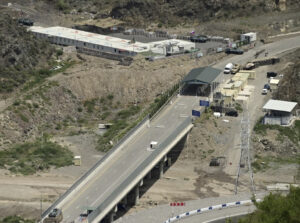- August 10, 2023
Yesterday, former ICC Prosecutor Luis Ocampo issued a detailed report asserting that Azerbaijan’s blockade of the Lachin Corridor constitutes Genocide according to the Genocide Convention in “deliberately inflicting on the group conditions of life calculated to bring about its physical destruction.”

Since Azerbaijan first erected the blockade in December 2022, U.S. Secretary of State Atony Blinken, USAID Administrator Samantha Power and EU leaders have rightly and publicly warned on multiple occasions of dire humanitarian consequences if Azerbaijan fails to lift its blockade of the Lachin Corridor. Moreover, several U.S. and EU leaders, including EU peacekeepers on the ground, have seen with their own eyes Azerbaijan’s blockade with the apparent support of Russian peacekeepers. In fact, Russian tanks are stationed on the ground next to Azerbaijani security forces at the blockade check point.
Global ARM strongly supports U.S. mediation between Armenia, Azerbaijan and Nagorno-Karabakh to achieve a lasting and just peace. But imposing an agreement where two parties, Armenia and Nagorno-Karabakh, are forced to make harmful concessions under occupation and the threat of Genocide is a path to further conflict. This must and can be avoided.
The U.S. and European Union have the tools to achieve the following immediate confidence-building measures and create the environment for a durable peace:
- Immediately lifting the Azerbaijani blockade of the Lachin Corridor and delivering critical humanitarian supplies to the people of Nagorno-Karabakh
- Immediate return of all Armenian POWs and captured civilians from Azerbaijan
- Immediate withdrawal of all Azerbaijani military personnel and installations from Armenia proper
- Targeted sanctions against Azerbaijan for violations of U.S. and international law including enforcement of Section 907 of the FREEDOM Support Act, enforcement of the Humanitarian Aid Corridor Act, Magnitsky Act Sanctions and Leahy Law sanctions
If these measures are taken, there is a chance to achieve a lasting peace where the people of Nagorno-Karabakh, Armenia and Azerbaijan can live freely with guaranteed physical security and protection of civil, political and religious rights.
